#Sleep research
Text
Interesting Papers for Week 16, 2023
Sleep deprivation and hippocampal ripple disruption after one-session learning eliminate memory expression the next day. Aleman-Zapata, A., Morris, R. G. M., & Genzel, L. (2022). Proceedings of the National Academy of Sciences, 119(44), e2123424119.
Aversive memory formation in humans involves an amygdala-hippocampus phase code. Costa, M., Lozano-Soldevilla, D., Gil-Nagel, A., Toledano, R., Oehrn, C. R., Kunz, L., … Strange, B. A. (2022). Nature Communications, 13, 6403.
Sleep preferentially consolidates negative aspects of human memory: Well-powered evidence from two large online experiments. Denis, D., Sanders, K. E. G., Kensinger, E. A., & Payne, J. D. (2022). Proceedings of the National Academy of Sciences, 119(44), e2202657119.
How do (perceptual) distracters distract? Dumbalska, T., Rudzka, K., Smithson, H. E., & Summerfield, C. (2022). PLOS Computational Biology, 18(10), e1010609.
The induced motion effect is a high-level visual phenomenon: Psychophysical evidence. Falconbridge, M., Hewitt, K., Haille, J., Badcock, D. R., & Edwards, M. (2022). I-Perception, 13(5), 204166952211181.
Salience memories formed by value, novelty and aversiveness jointly shape object responses in the prefrontal cortex and basal ganglia. Ghazizadeh, A., & Hikosaka, O. (2022). Nature Communications, 13, 6338.
Recurrent Hippocampo-neocortical sleep-state divergence in humans. Jang, R. S., Ciliberti, D., Mankin, E. A., & Poe, G. R. (2022). Proceedings of the National Academy of Sciences, 119(44), e2123427119.
Cone opponent functional domains in primary visual cortex combine signals for color appearance mechanisms. Li, P., Garg, A. K., Zhang, L. A., Rashid, M. S., & Callaway, E. M. (2022). Nature Communications, 13, 6344.
Hippocampal gamma and sharp wave/ripples mediate bidirectional interactions with cortical networks during sleep. Pedrosa, R., Nazari, M., Mohajerani, M. H., Knöpfel, T., Stella, F., & Battaglia, F. P. (2022). Proceedings of the National Academy of Sciences, 119(44), e2204959119.
Generalizing the control architecture of the lateral prefrontal cortex. Pitts, M., & Nee, D. E. (2022). Neurobiology of Learning and Memory, 195, 107688.
Natural scene sampling reveals reliable coarse-scale orientation tuning in human V1. Roth, Z. N., Kay, K., & Merriam, E. P. (2022). Nature Communications, 13, 6469.
Stable Working Memory and Perceptual Representations in Macaque Lateral Prefrontal Cortex during Naturalistic Vision. Roussy, M., Corrigan, B., Luna, R., Gulli, R. A., Sachs, A. J., Palaniyappan, L., & Martinez-Trujillo, J. C. (2022). Journal of Neuroscience, 42(44), 8328–8342.
A Midbrain Inspired Recurrent Neural Network Model for Robust Change Detection. Sawant, Y., Kundu, J. N., Radhakrishnan, V. B., & Sridharan, D. (2022). Journal of Neuroscience, 42(44), 8262–8283.
Distinct organization of two cortico-cortical feedback pathways. Shen, S., Jiang, X., Scala, F., Fu, J., Fahey, P., Kobak, D., … Tolias, A. S. (2022). Nature Communications, 13, 6389.
Predictive coding, multisensory integration, and attentional control: A multicomponent framework for lucid dreaming. Simor, P., Bogdány, T., & Peigneux, P. (2022). Proceedings of the National Academy of Sciences, 119(44), e2123418119.
A model of autonomous interactions between hippocampus and neocortex driving sleep-dependent memory consolidation. Singh, D., Norman, K. A., & Schapiro, A. C. (2022). Proceedings of the National Academy of Sciences, 119(44), e2123432119.
A robust core architecture of functional brain networks supports topological resilience and cognitive performance in middle- and old-aged adults. Stanford, W. C., Mucha, P. J., & Dayan, E. (2022). Proceedings of the National Academy of Sciences, 119(44), e2203682119.
Optimal noise level for coding with tightly balanced networks of spiking neurons in the presence of transmission delays. Timcheck, J., Kadmon, J., Boahen, K., & Ganguli, S. (2022). PLOS Computational Biology, 18(10), e1010593.
Dissociating the involvement of muscarinic and nicotinic cholinergic receptors in object memory destabilization and reconsolidation. Wideman, C. E., Minard, E. P., Zakaria, J. M., Capistrano, J. D. R., Scott, G. A., & Winters, B. D. (2022). Neurobiology of Learning and Memory, 195, 107686.
Inducing forgetting of unwanted memories through subliminal reactivation. Zhu, Z., Anderson, M. C., & Wang, Y. (2022). Nature Communications, 13, 6496.
#science#Neuroscience#computational neuroscience#Brain science#research#cognition#neurons#cognitive science#neurobiology#neural networks#neural computation#psychophysics#scientific publications#sleep research#memory research
17 notes
·
View notes
Text

GB WANDERER
#remote viewing#sleep research#hand drawn#inkdrawing#art#dark art#sketchbook#artwork#occult art#traditional art#deathtrip#dsbm#apocalyptic art#doomer#wanderer#art therapy#underground artists#artists on tumblr
2 notes
·
View notes
Text
How hours of sleep do you really need?
#Healthy Sleep#Sleep Duration#Restorative Sleep#Sleep Patterns#Sleep Quality#Sleep Hygiene#Sleep Science#Mental Health#Physical Well-being#Sleep Benefits#Energy Levels#Sleep Cycles#Sleep Deprivation#Better Sleep#Sleep Habits#Sleep Research#Sleep Recommendations#Optimal Sleep Hours#human body#sleep cycle#human body systems#importance of physical well being#sleep habits of successful entrepreneurs#sleep habits for better sleep
0 notes
Text
Hypnogogic Jerks
Resource:verywellmind.com
What Is A Hypnogogic Jerk And What Causes Sleep Starts?
Frequent sudden movements in sleep may require further evaluation.
Just after falling asleep, you may wake with a sudden jerking movement. What causes these so-called sleep starts? Learn about hypnogogic jerks, or hypnic Jerks, including the most common symptoms, and whether further evaluation and treatment may be necessary.
Hypnogogic vs. Hypnic Jerks
A hypnogogic jerk is a sudden and strong involuntary twitch or muscle contraction, that occurs while an individual is beginning to fall asleep. The same phenomenon is called a hypnic jerk if it occurs upon awakening.
Both are often known as a sleep starts. It may affect only part of the body, like an arm or leg. It may commonly seem to cause the entire body to jolt suddenly. In some cases, a vocalization or sharp cry may occur.
These movements may occur without waking the affected person. If an awakening does occur, these sudden movements are often associated with a brief mental image.
It is believed that the movements occur first, perhaps due to an electrical discharge along the body's nerves, and that the mental image or explanation follows. In a sense, the brain creates a story to account for the movement.
Why Do Sleep Starts Occur?
Sleep starts can be a normal part of sleep. It is estimated that 60 to 70 percent of people recall experiencing them. If they occur infrequently, as they often do, they are not usually distressing.
However, frequent events may lead to anxiety about falling asleep and insomnia, especially if the recalled explanation for the movement is upsetting (such as falling from a great height).
Hypnogogic jerks typically occur during stage 1 sleep. This is the lightest stage of sleep that occurs immediately after falling asleep. It may be misinterpreted as wakefulness, leading to confusion about when sleep starts to occur.
It may occur later in the night, but these events are less likely to be recalled.
Sleep starts to occur often with the increase use of caffeine and other stimulants. It may be provoked by physical exercise or emotional stress.
Sleep fragmentation may be caused by another sleep disorder, such as obstructive sleep apnea. Frequent episodes may warrant further evaluation.
Other Causes of Movement in Sleep
Beyond sleep starts, there are other conditions that may contribute to movements during the transition to our state of sleep. If you experience frequent sleep movements, several other causes may be considered.
Restless Leg Syndrome
Restless leg syndrome is characterized by an uncomfortable feeling often affecting the legs when lying down in the evening that is associated with an urge to move that is relieved by movement. It occurs during wakefulness.
Periodic Limb Movements of Sleep
Occurring during sleep, periodic limb movements consist of flexion and extension of the foot (and sometimes knee) in a rhythmic fashion.
These occur periodically in trains of events but may come and go in the night. Unlike hypnagogic or hypnic jerks, these are not single, isolated events.
Seizures
Depending on the type of seizure, there may be a large movement of the body. Generalized tonic-clonic seizure may be associated with tongue or mouth biting, loss of bladder control with incontinence, and even injuries.
After the episode, there may be a period of confusion. These last 1 minute on average and are usually easy to distinguish from sleep starts.
Shivering
If the sleep environment is cold, or a fever exist, it is possible that shivering may cause movements in sleep. This high-frequency movement may affect the extremities with the whole body.
These typically last longer than sleep starts, which are often sudden events that immediately resolve, and resolve with warming the body or treating the fever.
Fasciculations
If a specific muscle twitch, this may be called a fasciculation. It appears like quivering and may even look like a "bag of worms." These movements may occur across a joint and cause the contraction to move the extremity.
Fasciculation generally are more persistent than a sleep start and may be noted during wakefulness.
Further Evaluation of Sleep Starts
In general, it is not necessary to seek further testing or treatment for sleep starts. Reassurance that this is a normal phenomenon is often all that is needed.
If sleep movements occur frequently and are accompanied by the following symptoms, talk to your healthcare provider:
•Bedwetting
•Confusion upon awakening
•Mouth or tongue biting
•Physical injury
Sometimes these awakenings can be provoked by another sleep disorder, most commonly disrupted breathing like sleep apnea. Sleep starts may be exacerbated by medication or substance use.
In addition, movements in sleep can sometimes suggest seizures. It may be necessary to have a diagnostic sleep study called polysomnogram. Alternatively, an EEG may be ordered if seizures are suspected to be causing the uncontrolled movements.
A Word From Verywell
If you have frequent sleep starts that as are disturbing your sleep or the sleep of your bed partner, you may want to speak with a Board-Cerified sleep physician to get the evaluation and treatment that you need.
Is jolting awake from sleep caused by anxiety?
Jolting awake from sleep can be caused by anxiety. Stress from everyday life and anxiety disorders can lead to insomnia, which may increase the risk of hypnic jerks. Hypnic jerks can also be caused by exercising at night, a lack of sleep, and using stimulants like coffee at night.
How do I prevent hypnic jerks?
It's not possible to fully prevent jerks from occurring, but there are certain bedtime habits you can adopt to reduce their risk of waking you up. When you go to sleep, be sure to make your sleep environment as dark and quiet as possible. If noise is an issue, consider using bedtime ear plugs or a white noise machine to drown out external sounds. Try sleeping at the same time each night, and avoid electronic devices at least half an hour before sleeping.
Can you have hypnic jerks while wide awake?
No, you cannot have hypnic jerks while wide awake. Hypnic jerks only happen while waking up from sleep or during sleep. Muscles twitches while awake could be a fasciculation, or muscle twitching and quivering that can sometimes be powerful enough to move a joint.
0 notes
Text
Mike: is struggling financially and mentally
Vanessa: *throws his prescription medicine*

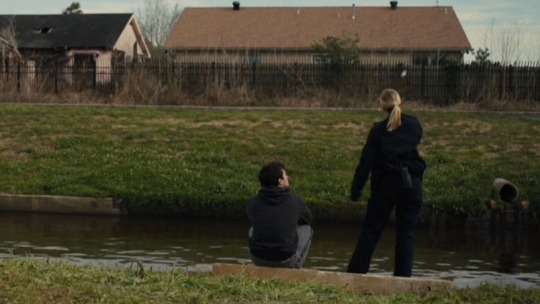
Edit: it's not just about whether Mike needed the drugs (which he didn't, i understand), it's about the fact SHE LITTERED and most likely polluted the river too.
#oh whats that? you been taking these on a regular schedule for the past 10+ years? nah you'll be fine going cold turkey :))#and these are only like $20-$50US+ a week or smt you'll be fine lol let me just litter this#fnaf movie spoilers#fnaf#fnaf movie#five nights at freddy's#mike schmidt#vanessa monroe#elizabeth afton#josh hutcherson#elizabeth lail#william afton#halloween#happy halloween#(btw idk usa sleeping prescription medication prices i just went off my research. but if you know lmk)
17K notes
·
View notes
Text
17-03-2023
Happy sleep day! Let's just get back to bed.
Though today was personally not a day I wanted or could have crawled in my bed and slept. But the ironic thing was, on the 'sleep day' when people were discussing how everyone should sleep, i was presenting my work on sleep deprivation in flies. Isn't that just inspiring!
Everything aside, sleep has always been an enigma to me. Dreams are the other. Till today there has been research going on around the globe on 'why we sleep'? With so much thought into sleep research, we surely know that it is not an evolutionary mistake - it is one of the indispensable processes nearly all species have. Sleep is believed to have begun with life. Hydra which are microscopic can sleep! What does this say? Sleep evolved before even the brain could. Fly (Drosophila) sleep and circadian rhythm is the rising field of biology. Interestingly studies are putting forward the possibility of flies having stages of sleep (REM and NREM). Does this mean flies can dream? What do you think they dream of?
Sleep well !
0 notes
Text
If you ask the chain for their worst/ most annoying enemy
Time: redheads- I mean Redeads
Twilight: *stifling a laugh* Shadow beasts
Four: *deadpan* Gibdos
Legend: *can't think of anything challenging* I'm gonna say, umm... *shoots a teasing glance at Sky* Sleep
Wild: definitely Guardians
Sky: Demon lords with long tongues
Hyrule: *looks at Sky* not even gonna ask about that one, but Octorocks. They're everywhere in my world
Wind: I was gonna say Octorock too! But specifically Big Octo, those are the worst
Warriors: ...
Warriors: SO WHAT AM I THE ONLY ONE WHOS GONNA SAY GANON
#wasn't meaning to put redheads instead of redeads for time but autocorrect did that and I decided to roll with it#I don't have all the games. I did research for four#but a lots of this is mainly what enemies I hate the most tbh#shadow beasts are terrible and I want to rid Hyrule's world of octorocks more than I want to be rid of ganon#linkeduniverse#linked universe#lu#Lu chain#Lu memes#but actually? I honestly don't see legend as really struggling with any enemies- even ganon#bros got skill#which is why I said sleep because double meaning- but I also couldn't think of anything else :|
550 notes
·
View notes
Text
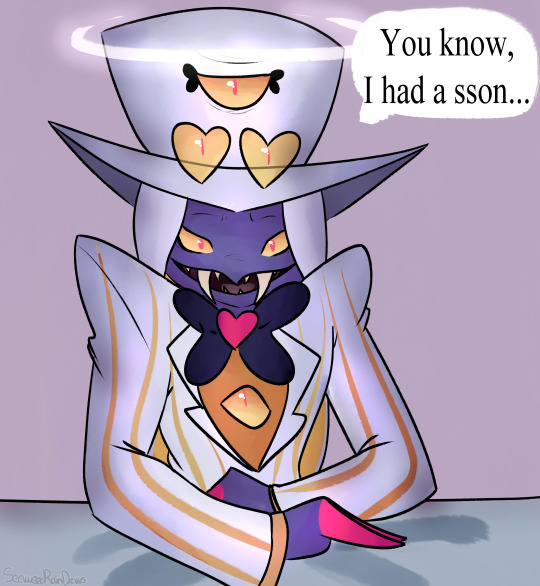
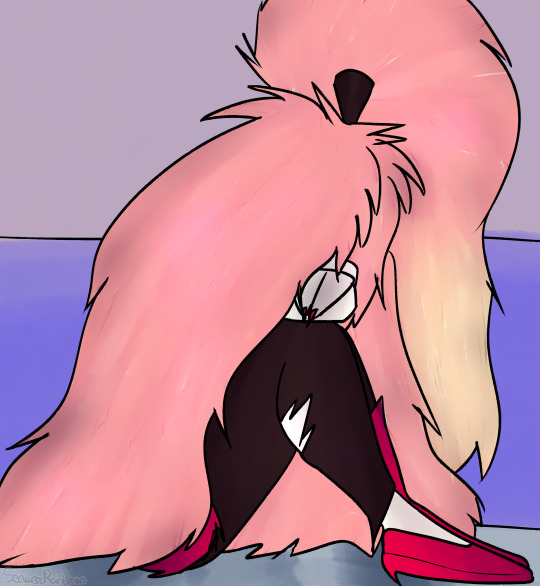
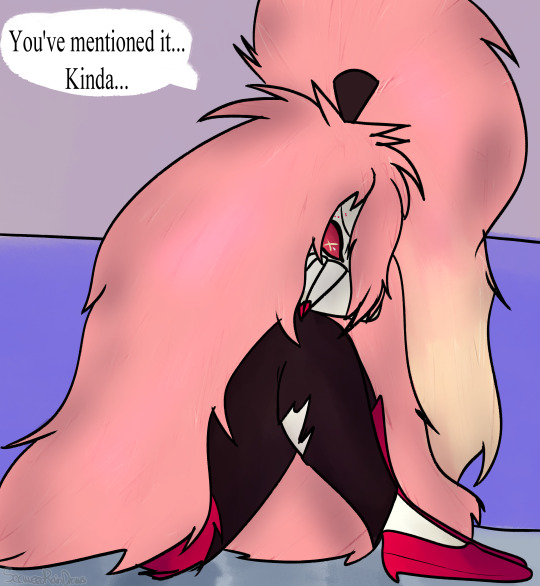

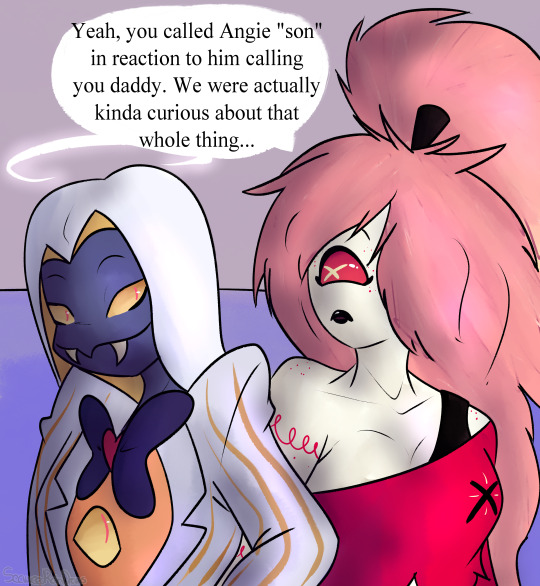
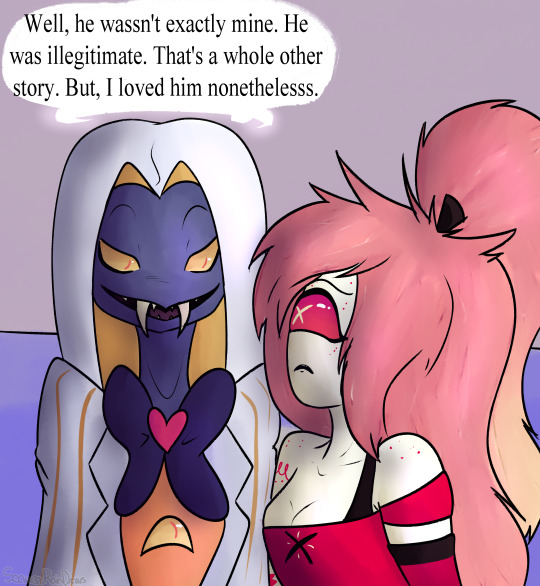

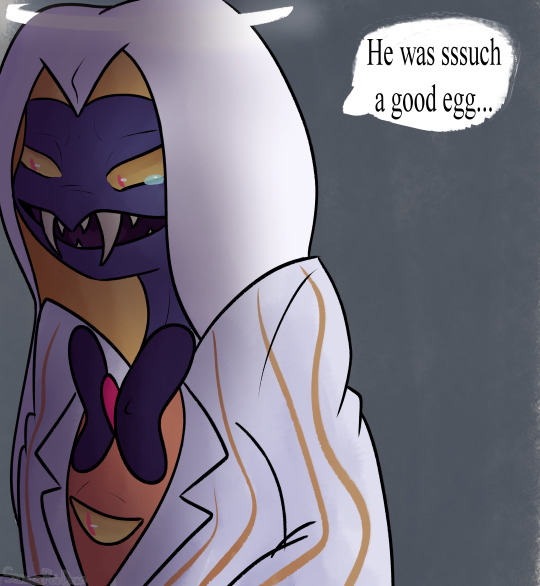


I was saving this for my fanfic but I liked the idea so much I had to draw it!
Bonus:
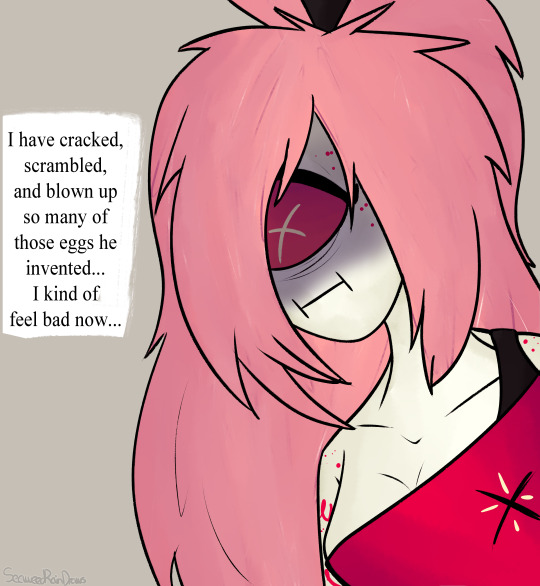
Here is a link to the fic this scene is from! (Only chapter 1 is up, so this scene has not yet happened)
#cherrisnake#cherri bomb#sir pentious#hazbin hotel#hazbin hotel fanart#hazbin hotel comic#So this is a headcanon I've had in mind for a while now! I don't know if anyone else has pointed it out yet#but when I was doing research I never saw anyone mention the term Good Egg#which apparently came from the 1800s#and I thought it only made sense that if he did have some son then he'd have considered that kid a Good Egg#and therefore Eggs have a greater meaning in his life#having probably said that term so often when he was living#I really do like the idea of having the Egg Boiz be like his own children in some way#And the realization hitting Cherri that she'd just been breaking them because they were just his inventions just mmmh#the angst#me sleeping well tonight knowing I made this somewhat sad comic
491 notes
·
View notes
Text
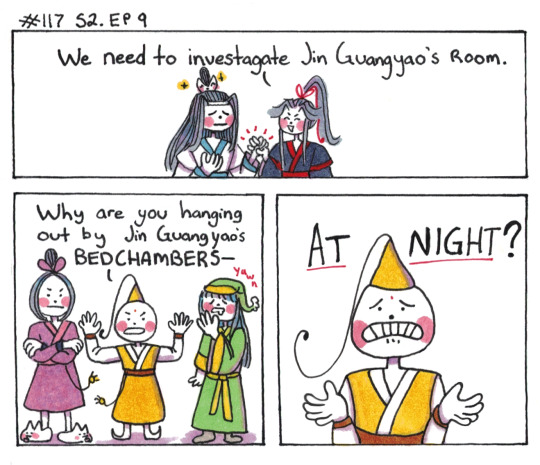
+3 friendship with Jin Ling: He actively tries to dissuade you from further embroiling yourself in the homosexual allegations.
[First] Prev <–-> Next
#poorly drawn mdzs#mdzs#wei wuxian#lan wangji#jin ling#jiang cheng#nie huaisang#For real though it's so sweet how desperate he sounds when trying to save mxy's face.#Jin Ling genuinely likes this uncle! He's let him into his heart!#Why his uncle is so desperate to make his reputation worse is beyond him!!!#The same uncle who has time and time again proven to be genuine in his intentions and has been there for JL in so many ways!#JL wants to return the favour! Alas it is like holding a dog back from eating the onion chips on the ground.#I sure hope nothing betrays jin ling's trust in this new bond!#(and yes I am keeping NHS and JC's sleep wear in the next scenes. For the whimsy)#In other news - LWJ finally gets a little hand hold. Most likely it was a highfive that lasted a little too long.#But it counts okay? To him it counts.#Speaking of: I went sooooo long in life not realizing the 'hee hee let's compare hand sizes' was a flirt move.#I thought people were just genuinely curious about fingers and hands. But no. It's not that. It's a hand hold move.#I'm here for the science and research. You are here to flirt. We are not the same.
941 notes
·
View notes
Text
in. clover lives aus or aus where they choose to live in the underground whatnot. i think more ppl should play with the idea that their friends know Jackshit About Humans. please and thanks
#undertale yellow#starlo thought humans were fireproof. whos gonna tell him#martlet was only able to recognize them for their hat#im sure they know SOME but. it would be sooo fucking funny if that knowledge is a limited as possible#monsters arent made of flesh n blood. do they know how to deal with scraps n bruises#do they know human sleep schedules. do they know about human health and illness. is anyone gonna tell starlo that clovers not fireproof#ive always been obsessed with scenarios of non-humans learning human facts jfkf things that r obvious to. us ofc#its always silly#anyway all that to say i have yet to see ONE sickfic <- disappointed#also im procrastinating doing research for school#guuuuyyyys if you loved me you talk to me while im doing researches. it helps i prommy
293 notes
·
View notes
Text

harrier if you didn’t want this to be romantic why did you wear your most boobylicious shirt ???
#answer the question harry#shoutout to alex brainrotdotorg for helping me with the dialogue options :3#i haven’t been that active so i’m just like *drops this like a hot potato and runs from the room*#i think i’d pick 3 or 5#man i STRUGGLED with this piece#i literally went to outback steakhouse and got a bloomin onion with a friend as research for this#i tried like 5 different versions before i got a drawing i didn’t despise#it’s been an uphill battle making this stupid fucking comic#i’m gonna cry myself to sleep now#my art#disco elysium#harry du bois#kim kitsuragi#oh also kim is drinking a dr pepper and harry is drinking a fancy juice. in case you were wondering#he loves juice. he’s just like me
2K notes
·
View notes
Text
How Many Hours of Healthy Sleep Are Required for Your Rest and Energy?
Sleep is vital for our bodies to rest and energize us for the next day. Many might be concerned about the proper hours of sleep every night and the best practices for getting the most out of their nightly rest. watch our recent episode about sleep
#Healthy Sleep#Sleep Duration#Restorative Sleep#Sleep Patterns#Sleep Quality#Sleep Hygiene#Sleep Science#Mental Health#Physical Well-being#Sleep Benefits#Energy Levels#Sleep Cycles#Sleep Deprivation#Better Sleep#Sleep Habits#Sleep Research#Sleep Recommendations#Optimal Sleep Hours#human body#sleep cycle#human body systems#importance of physical well being
0 notes
Text
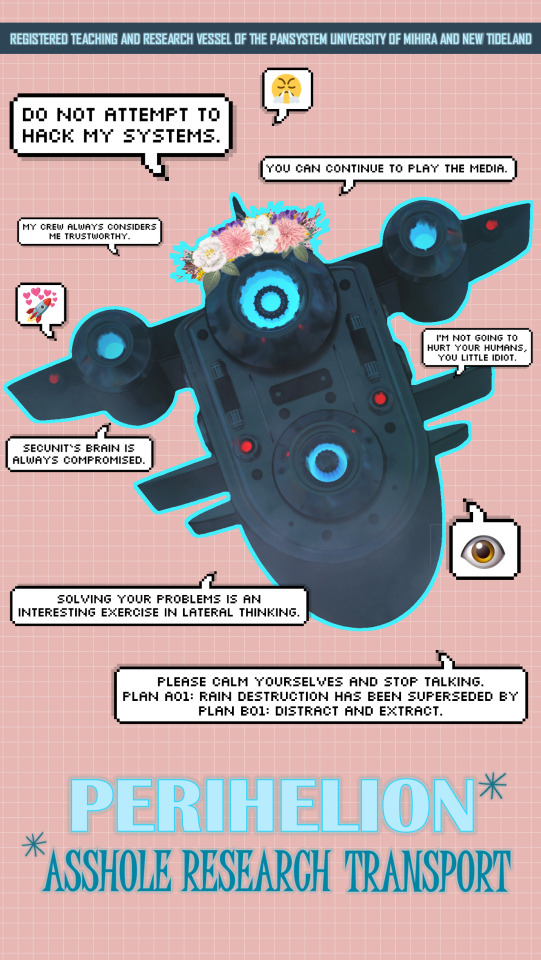



i made a few silly little ART phone backgrounds in the spirit of the inofficial fandom shenanigan renaissance! thank you so much for inspiring me to do this @the-yearning-astronaut!
#the murderbot diaries#murderbot#asshole research transport#perihelion#cringe is dead and ART killed it#did i spent 1 hour deciding which flowers to use for ART's flower crown? yes#are they now so small that no one will be able to tell anyway? also yes#the ART art is from the latvian cover of artificial condition by andis reinbergs (i edited it a little because murderbot was in the way lol#this was so much fun!!!#there will probably be more#but first SLEEP#[if you need the alt text for the image description and it would be better if i repeat the description of the image that i gave ->#for the first image in the alt text of the other images too please let me know and i will change it and know for the future.#i figured it would be less redundant this way but i don't know what is preferable. thanks! :)]#𓄿
704 notes
·
View notes
Text


#let poor child Shinobu sleep without nightmares#I meanwhile have been waking myself up around 2-3am every night with dreams about MY RESEARCH#my art#kochou shinobu#kocho shinobu#himejima gyomei#himejima gyoumei
513 notes
·
View notes
Text
16-03-2023
Today I was listening to a podcast on "cry research". Having a bit of experience, I can say that 75% of your research career is about crying! Sometimes you cry about how nothing is going according to you, other times about not having enough time (fact being, u are always in a time crunch!). There are some other times when you are done with everything and everyone. Keeping these aside, what made me go to this podcast was the fact that it is actually asking the question of why we cry? Why do we have tears?
We usually hear people saying that crying makes them feel better. But is it really the case? One of the research studies conducted showed that only in 50% of the cases this is true. The "'feeling better' part also has pre-requisites, mainly the question of 'what are you crying about?'. If it is something that can be changed then crying makes you feel better, but if it's something unchangeable then apparently crying does not make you lighter or happier. It somewhat makes sense to me- if I am crying because of losing someone, no matter how much I cry, it never feels better: but if it's some assignment I'm struggling with, then sometimes putting out my fear as tears clears my mind (*everything's person here:)
There was also this part in the podcast which stressed on how crying is more of a social communication than being an internal stress response. Babies cry to call parents for their help and care. Adults also cry for help. Sometimes we also cry just by seeing others cry- it is phrased as being 'empathetic'. In short "crying makes people see. Gives some kind of recognition". And the researcher argues that this social recognition is the whole crux of why we cry.
Darwin believed that emotional tears have no function. Surely we know now that it's not true. But it was ironic that there has been no neural studies or long term studies on why we cry. Although crying is something all of us are experienced of, it is still an enigma!
Finally, why is it so difficult for some people to cry?
1 note
·
View note